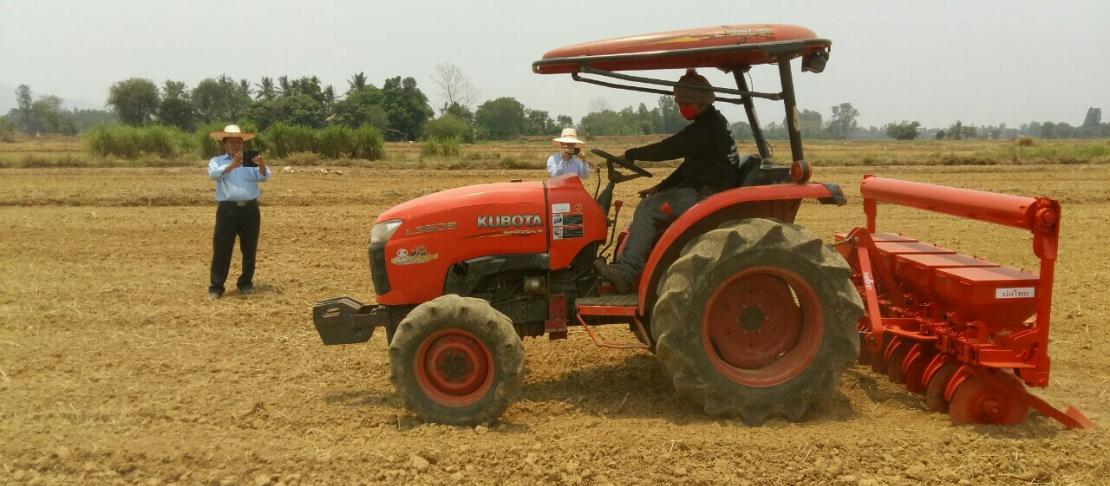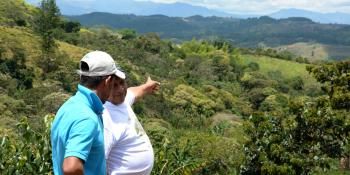Dry-direct seeding rice: A promising solution

During a study tour in Thailand, Vietnamese rice experts and authorities learned about dry-direct seeding rice, an alternative practice that could address the water and labor crises in Vietnam’s major rice production hub.
The 2016 El Niño-Southern Oscillation brought severe drought and salinity intrusion, which are now affecting the rice production sector in the Mekong River Delta (MRD). The Ministry of Agriculture and Rural Development (MARD) of Vietnam recognized that this crisis and its subsequent effects will recur in the future; hence, the development of suitable adaptation solutions to climate-related risks is an urgent and important concern.
Efforts to improve rice production in MRD have been implemented by MARD in the last decade, including partial mechanization. But according to Dr Nguyen Hong Son, Director General of the Department of Crop Production of MARD, with the current production challenges, including the impacts of climate change, “it is about time to implement synchronous mechanization (in land preparation, wet/dry direct seeding/sowing, harvesting). This will reduce production costs and shorten harvesting time, which will result in increased income among our farmers in MRD. It will also be important in successfully implementing the criteria for Building New Rural Areas”.
As a support to the adaptation efforts of Vietnam, the CGIAR Research Program on Climate Change, Agriculture and Food Security in Southeast Asia (CCAFS SEA) organized a joint study tour in Thailand last April 2018. It was attended by Vietnamese rice researchers, extension workers, and local decision makers from the Vietnam Academy of Agricultural Sciences (VAAS), Cuu Long Delta Rice Research Institute, and the Department of Crop Production of Soc Trang Province. The study tour aimed to introduce the experience of Thai farmers on the large-scale adoption process of dry-direct seeding rice (DDSR), a viable alternative to address regional scarcity of fresh water in irrigation caused by the drought and salinity intrusion in MRD.
More commonly applied in rainfed and upland areas, DDSR is a crop establishment practice wherein seeds are sown directly into the soil. Aside from helping farmers address the high labor cost in rice production, DDSR has proven to reduce water consumption as no rice seedling is being transplanted into standing water.
During the field visits, the Vietnamese team was introduced to existing techniques and equipment of DDSR being used by Thai farmers and local organizations. The team was also updated on the progress of the nationwide implementation of DDSR by the provincial rice research departments and their centers in Thailand. Together, they discussed the policy mechanisms and financing support from stakeholders (i.e., government, private sector) who favour the application of DDSR.
The team brought home several lessons from the visit:
- Rising scarcity in terms of water supply and labour force triggers the shift from puddled transplanting or wet sowing to DDSR. Since it is a water- and labour-efficient practice, DDSR is a potential alternative to address the fast-emerging water and labour crises arising not only in irrigated rice areas but also in rainfed areas.
- The success of DDSR practice depends on precise land levelling, suitable cultivars, good crop establishment, precise water management, and effective and efficient weed and nutrient management.
- Research and development initiatives must be conducted, especially in potential adopting areas, to foster a sustainable DDSR practice.
These lessons, as well as other insights and relevant information, will be redirected to MARD and will be integrated into plans and strategies to improve adaptive capacity of the MRD.
Iinspired by his experience in Thailand, Dr. Son noted that “building a centralized mechanization model in MRD is essential, as it will make the planting/sowing, tending and harvesting efficient, ensure that the production schedule is on time, and reduce production costs and labor.” He also emphasized that technologies like DDSR will “help enhance the effectiveness of the agricultural service cooperatives and promote the advantages of the collective economic models in the rural areas.”
Read more:
- News update: An integrated system for real-time monitoring of rice production and climate risks
- News update: Climate-Smart MAPs to aid in rice production at the Mekong River Delta of Vietnam
- News update: Learning from Vietnam’s experience on Climate-Smart MAP - South-South Collaboration
Eisen Bernardo is the Senior Communication Specialist of CCAFS Southeast Asia. Duc Minh Ngo is a Science Officer at the Department of Science and International Co-operation of the Vietnam Academy of Agricultural Sciences (VAAS).




